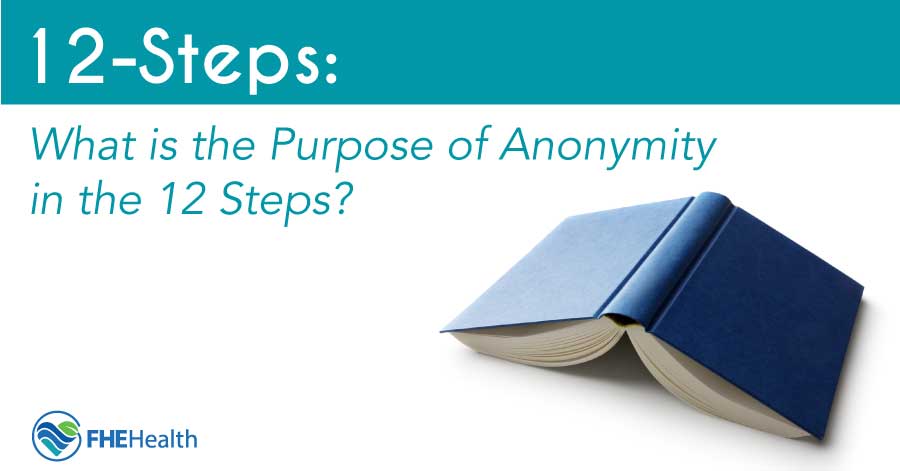
By now, most people are aware of Alcoholics Anonymous (AA) but what does that second word imply? This discussion will focus on what anonymity is and why it is a central theme in the Alcoholics Anonymous and other 12-Step based programs.
What Is AA Anonymity?
The word “anonymity” is defined as the state of being anonymous, but anonymity in AA has a deeper meaning. This word is primarily found within the 11th and 12fth traditions of Alcoholics Anonymous. The founding members of AA created the traditions to keep the primary purpose of AA in focus: helping people recover from alcoholism.
AA’s version of Anonymity is firmly rooted in the principle of humility. It reminds members that Alcoholics Anonymous is not meant to be advertised on a billboard; it is meant to be shared as a solution to alcoholism, through the sharing of lived experience and storytelling. It also seeks to create equity amongst members in the AA fellowship by asking them to set aside their personal beliefs, biases, or feelings about a specific person or situation, remembering that all members have a common goal, recovery. Finally, it seeks to create a safe environment by calling for confidentiality for all who attend. Let us look deeper at the two traditions that talk about anonymity, and the principles they support.
What Tradition 11 Says About Anonymity
Tradition 11: Our public relations policy is based on attraction rather than promotion; we need always maintain personal anonymity at the level of press, radio, and films.
The founding members created this tradition to ensure that people who view themselves as AA members would not be tempted to present themselves as AA spokespeople. They did this for several reasons.
Humility
This tradition seeks to remind members that they are to practice humility when it comes to talking about their recovery. It asserts that no single person can represent themselves as knowing everything about Alcoholics Anonymous or having all the answers to recovery. There are no AA gurus, nor should there be. This tradition in its long form states “There is never need to praise ourselves. We feel it better to let our friends recommend us.” This tradition summons humility, expecting that a person who openly shares their recovery in any capacity needs to pause and check their motives. Are they trying to show the world, “look how amazing I am,” or are they expressing gratitude by demonstrating the recovery values of humility and honesty. Are they sharing their story to offer a new person hope?
Trusted Servants
The program of Alcoholics Anonymous is not about individual people. This is clear to some of the other AA traditions. For instance, the very first tradition states, “Our common welfare should come first; personal recovery depends upon A.A. unity.” Those early members knew it could be risky for someone to publicly identify themselves as the leader or spokesperson for AA, because no one is. Even those who assist in the structure and support of AA, are simply called “trusted servants.” They represent the group or committee they serve, not all of AA. Also, because substance use disorder recovery, like other chronic diseases, is not linear, and members may return to drinking. If a person implies that they “represent” AA and they return to drinking, the public may misinterpret this as proof that the program does not work, discouraging others to consider using the AA program.
Attraction not Promotion
This tradition focuses on the principle of attraction rather than promotion. The founders quickly learned that the humility of practicing active recovery has been more effective than proselytizing others and telling them they must join. Early members discovered that rather than marketing a “solution” to the world that they could more effectively demonstrate the positive outcomes of working an AA Program through action, living a life of recovery, and sharing their personal stories individually. When speaking with others, AA members are encouraged to use first-person language such as “this is what I did to stay sober” instead of “you should do this.” Over the years there has been a movement towards the public advocacy of recovery, and we will talk a little more about that at the end of this article. But to be clear, the advocacy of recovery is quite different than publicly claiming to be a spokesperson for Alcoholics Anonymous or even a member of AA.
What Tradition 12 Says About Anonymity
Tradition 12: Anonymity is the spiritual foundation of all our traditions, ever reminding us to place principles before personalities.
Anonymity as a Spiritual Concept.
The founding members of AA believed that even the appointed “leaders” of an AA group needed to keep their individual opinions out of the decision making, but to instead rely on the “group conscious” when making decisions. The goal of this tradition was created to keep those who entrust Alcoholics Anonymous with their lives, feeling safe, supported, and secure, and to ensure that the stronger egos in the groups stayed in check. The AA literature, the 12 Step and 12 Traditions warns that early members “changed from AA members to AA show-offs” making the founding members realize they needed to create boundaries around interactions and confidentiality. Recovery needs are quite different for every individual and there is no one person that can tell another person that they have all the answers. The spirituality of a humble approach is the bedrock that all the Alcoholics Anonymous traditions rest upon.
Principles before Personalities
This tradition is meant to remind members that every person who attends AA deserves to be respected and valued regardless of stature, income, culture, fame, spiritual belief, or even level of willingness. This tradition, “repeatedly asks us to give up personal desires for the common good.” Humility is again referenced as the basis of this concept: the idea that a person with several years of recovery can indeed learn from someone with one day sober.
Given that AA is comprised of human beings that have subjective opinions, there is bound to be disagreement. This principle is a reminder that the common goal is sobriety, not being right. It calls for civility when there are disagreements. Every member’s interpretation of the 12 Steps of AA needs to be respected. For instance, what a “Higher Power” means to one person will certainly not be the same for another, but every member has the right to talk about their beliefs and have those beliefs honored. Everyone has the right to tell their story.
Confidentiality
The need for personal privacy around membership is essential for AA. The founders discovered that those seeking help often need a sense of discretion to feel comfortable, especially in early recovery when a person might feel the most shame. The stigma of use disorders has come a long way but still has a long way to go. No member has the right to disclose another person’s participation in AA. Often AA groups begin or end their meetings with the saying, “Whom you see here, what you hear here, when you leave here, let it stay here.”
Individually a member may disclose their participation in the AA fellowship to anyone they choose, but they should never share someone else’s participation in AA meetings, even if their intention is good. There are reasons beyond shame for why a person may want to remain anonymous. For instance, a person’s employment could be impacted by a disclosure that someone is seeking help for alcoholism. The focus on confidentiality in the fellowship also works to keep gossip at bay. It encourages members to talk to each other, not about each other.
Of course, AA is comprised of people who are in various stages of recovery and may still be struggling. Alcoholics Anonymous is a public organization with doors that are open to anyone seeking sobriety. What that means is that one is never fully guaranteed confidentiality when participating in Alcoholics Anonymous. Additionally, one may encounter challenges with individuals and their approaches, however, please know that as described in the traditions, no one person or meeting fully represents Alcoholics Anonymous. It is helpful to attend a variety of meetings and interact with a variety of members before you decide where and with whom to build your recovery support circle.
I will borrow one of my favorite sayings from a reading of the Narcotic Anonymous version of the Twelve traditions to summarize the goal of anonymity. “As long as the ties that bind us together are stronger than those that would tear us apart, all will be well.” Anonymity tempers those who might seek to use AA for personal gain. It encapsulates the idea that the common bond of recovery brings everyone together and that this bond is the central goal of Alcoholics Anonymous.
More on Advocacy and Anonymity
Over the years, people in recovery noticed that there were negative aspects to being so “anonymous.” The general interpretation of anonymity was that people should never explicitly state they are in recovery in the media, but this is a misinterpretation. AA’s traditions ask that people do not state their affiliation specifically with AA. As stated on their website, “A.A. members may disclose their identity and speak as recovered alcoholics, giving radio, TV, and online interviews without violating the Traditions so long as their A.A. membership is not revealed.” In fact, the founders of AA told their personal stories and were founding members of one of the first recovery advocacy organizations, the National Council on Alcoholism and Drug Dependence (NCADD).
Advocacy with Anonymity means you can share your lived experience anywhere; with anyone you choose to. You can simply identify yourself as a person in recovery and not say you are in AA. With so many support options available, some people in recovery do not utilize AA, but the point is to show others that there are solutions to the problem of substance use disorders and that recovery is possible. It also demonstrates that people do not have to be ashamed of having a disease nor of being in recovery from it. In 2024, there were over twenty-one million Americans who identified themselves as being in recovery from a substance use disorder, according to the presidential proclamation honoring National Recovery Month.
Bringing recovery into the light has led to a reduction in stigma, increased resources, awareness of those resources, and pro-recovery public policies. Recovering “out loud” or being open about it, has empowered individuals, helped more people seek help for their substance use disorders, and has educated the world that there is hope for recovery for everyone. We are living proof.
*A quick note to mention that AA may not be a fit for everyone. However, community support is an important part of use disorder recovery for most people. Check out our resource page for more options for community support.
FAQs on Anonymity in AA
The AA General Service Office estimates that AA had more than 2.1 million members in 2018. For every member, anonymity enhances privacy and makes it easier to share during meetings. We’ve answered some of the most frequently asked questions about anonymity to help you understand what it entails and why it’s beneficial to you as an AA member.
You don’t have to feel ashamed about your alcohol use. If you need help to recover from alcoholism, contact FHE Health today, a treatment facility in Florida. We have a team of caring professionals available to discuss any AA questions you have, as well as your circumstances, to determine the best course of treatment.
References and Resources
https://www.aa.org/the-twelve-traditions
https://www.aa.org/aa-and-anonymity
https://www.aa.org/twelve-steps-twelve-traditions
https://www.federalregister.gov/documents/2024/09/05/2024-20126/national-recovery-month-2024









